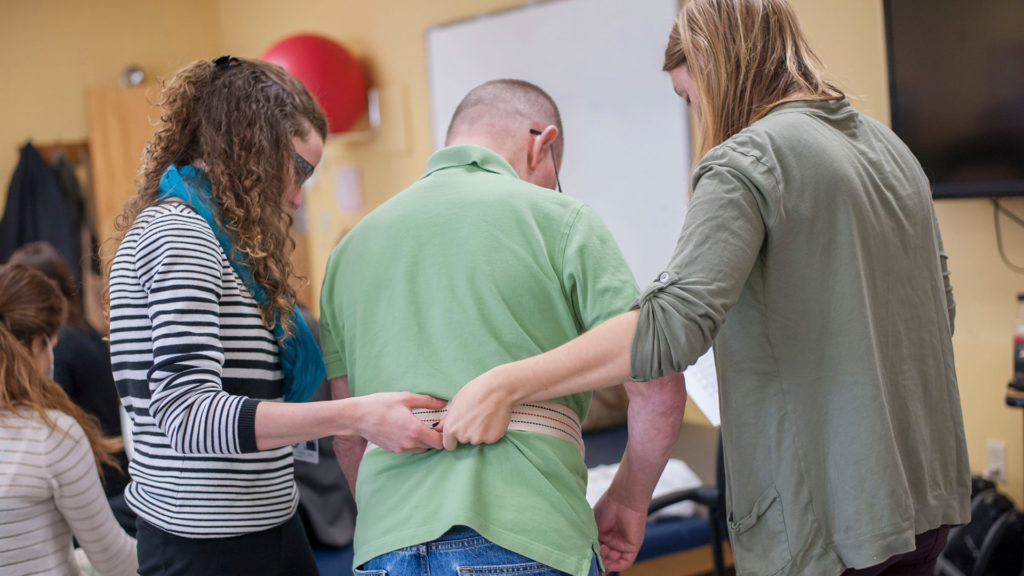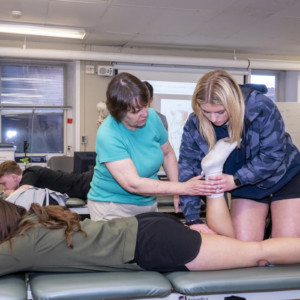
Program Highlights
Find all of all of the following distinctions at an institution recognized for its Health Sciences programs, giving you lots of interaction with other health care fields, which you will ultimately engage with as a professional who make a difference in your community.
Course Requirements
Credits and Completion
View the 100 credit entry-level occupational therapy doctoral degree program at Russell Sage College course details, fieldwork requirements, and doctoral capstone experience information.

Admission Requirements
Apply by June 1 and start in the fall semester.
Applicants should have a minimum undergraduate GPA of 3.25, and should have completed the following prerequisite courses:
- Anatomy & Physiology I and II, with labs. Note that a 3.0 average in Anatomy & Physiology I and II is required for admission.
- Introduction to Psychology/General Psychology
- Human Development/Lifespan Development
- Abnormal Psychology
- Statistics
- 3 credits of Sociology or Anthropology
- Medical Terminology
- Physics recommended
Additionally, students should complete and document a minimum of 40 hours of clinical observation under the supervision of an occupational therapist prior to beginning the professional program.
Application Requirements

Our doctorate program comes with a deep, Russell Sage-level of support from an assigned faculty advisor who works with you to ensure your success.

Your Future Career with a Doctorate in Occupational Therapy
Upon completing your Occupational Therapy doctoral degree, you’ll be eligible to take the certification exam administered by the National Board for Certification in Occupational Therapy, which leads to national certification and eligibility for state licensure.
Alumni of our Occupational Therapy graduate programs hold clinical and leadership roles in hospitals, rehabilitation centers, nursing homes, schools, private practice and community agencies across New York state and around the country. Recent employers include Albany Medical Center, St. Peter’s Health Partners, Capital District Beginnings, Anderson Center for Autism, United Health Services, and Metro Therapy.
Learning Experiences
Fieldwork and Capstone Experience
As an Occupational Therapy doctoral degree candidate, you will work therapeutically with clients under the supervision of licensed occupational therapists during five fieldwork experiences: three multi-week placements in clinical and simulated settings connected with your first and second-year coursework, and two full-time, 12-week fieldwork experiences with responsibilities leading to those of an entry-level occupational therapist.
More than 400 clinical sites throughout the country host our Occupational Therapy students for fieldwork experiences.
You will also design and complete a 14-week doctoral capstone experience that combines experiential learning, scholarship, and professional service in one or more of the following areas: clinical practice skills, research skills, administration, leadership, program and policy development, advocacy, education or theory development.
Professional Development
Sage’s Health Sciences programs stress interprofessional education and create opportunities for future occupational and physical therapists, nurses, dietitians, mental health professionals and others to learn together, in preparation for roles on interprofessional health care teams. Our department has a leadership role in three interprofessional conferences each year, which attract hundreds of health sciences students from Sage and other colleges.
We also have an award-winning chapter of Pi Theta Epsilon, the national honor society for Occupational Therapy students.

Doctorate of Occupational Therapy Alumni Spotlights
Read more from students, faculty and alumni of our OTD program.
OTD Tuition and Fees
| Cost of Attendance Doctor of Occupational Therapy Program AY 2024-2026 | ||||||||||||
| Year 1 | Total Yr 1 | Year 2 | Total Yr 2 | Year 3 | Total Yr 3 | Program total | ||||||
| Fall | Spring | Summer | Fall | Spring | Summer | Fall | Spring | |||||
| # Credits | 17 | 16.0 | 14 | 17 | 9.0 | 5 | 7 | 9 | 94 | |||
| Cost per semester | 16575 | 15600 | 13650 | 45825 | 16575 | 8775 | 4875 | 30225 | 6825 | 8775 | 15600 | $ 91,650 |
| Student Fees/yr | 850 | 850 | 850 | $ 2,550 | ||||||||
| Supplies & Book/yr | 750 | 750 | 750 | $ 2,250 | ||||||||
| Total Cost | $ 47,425 | $ 31,825 | $ 17,200 | $ 96,450 | ||||||||





